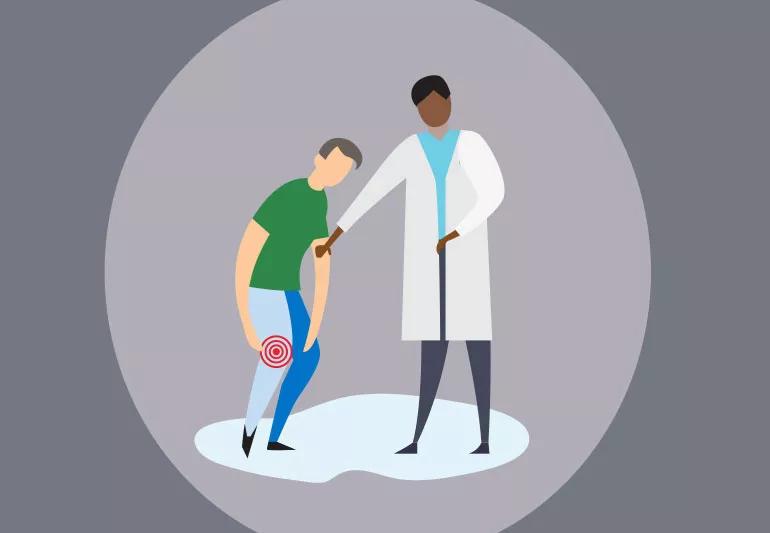Most primary care doctors can treat osteoarthritis, but sometimes a specialist is needed

Image content: This image is available to view online.
View image online (https://assets.clevelandclinic.org/transform/33cca237-a2f1-4ea6-82ea-a16ea361e1e0/arthritisDocs-1181219798-770x553_jpg)
Illustration of doctor and patient with arthritis in knee
If you have joint pain and think it might be arthritis, you may wonder what type of doctor you should see. Should you go to an orthopaedist or a rheumatologist or some other specialist?
Advertisement
Cleveland Clinic is a non-profit academic medical center. Advertising on our site helps support our mission. We do not endorse non-Cleveland Clinic products or services. Policy
The most common type of arthritis is osteoarthritis, and for that the place to start is with your primary care doctor. “If you have aching joints with activity or walking and it’s persisting, it’s probably osteoarthritis, says orthopaedist Michael Star, MD.
Here Dr. Star explains what various types of doctors can do to treat arthritis:
Primary care doctor – A primary care doctor can manage osteoarthritis with standard treatments, like anti-inflammatory pain medications and referral to a physical therapist. The doctor will probably order X-rays. “That’s usually all that is needed,” Dr. Star says. An MRI isn’t necessary.
If the doctor suspects there might be some other cause of joint problems besides osteoarthritis, a rheumatologist will be consulted. If your symptoms don’t improve or get worse, your doctor may send you to an orthopaedist or a rheumatologist for more intense medical management or an orthopaedic surgeon for surgery.
Orthopaedists – Orthopaedists are doctors who treat injuries and diseases of the musculoskeletal system, including osteoarthritis. For arthritis that gets worse despite treatment, they can perform injections of corticosteroids (powerful anti-inflammatory drugs) or hyaluronic acid (a substance that lubricates joints).
Advertisement
For severe arthritis that causes significant pain and seriously limits daily life, an orthopaedic surgeon can perform surgery, such as joint replacement.
Rheumatologists – Rheumatologists specialize in musculoskeletal diseases and autoimmune conditions. They treat all types of arthritis, including osteoarthritis, rheumatoid arthritis and psoriatic arthritis.
If there’s a chance you have something other than osteoarthritis, you will be sent to a rheumatologist. They provide treatment for joint diseases, including prescribing medications and giving injections. They do not perform surgery.
Other specialists – Sometimes the specialist you see will be dictated by the location of the problem. Some medical centers have specialized spine centers. This may be the place to go to be treated for osteoarthritis of the spine.
Most doctors, regardless of their specialty, will probably send people with osteoarthritis to a physical therapist. “That is the treatment that’s shown to have the greatest benefit,” Dr. Star says.
This article first appeared in Cleveland Clinic Arthritis Advisor.
Advertisement

Sign up for our Health Essentials emails for expert guidance on nutrition, fitness, sleep, skin care and more.
Learn more about our editorial process.
Advertisement
Simple exercises like tendon glides and finger lifts can have a big impact
Research is inconclusive, so don’t stop eating tomatoes, potatoes and peppers just yet
From heating pads and ice to exercises and splints, find the relief that works for you
What’s the difference between these types of inflammatory arthritis?
The link between joint pain and skin rashes
What’s the difference between these types of arthritis?
Remember to start slow and if things don't improve, ask your doctor about more advanced solutions
Working out is one of the best things you can do to improve your symptoms
Type 2 diabetes isn’t inevitable with these dietary changes
Applying a hot or cold compress can help with pain
Pump up your iron intake with foods like tuna, tofu and turkey